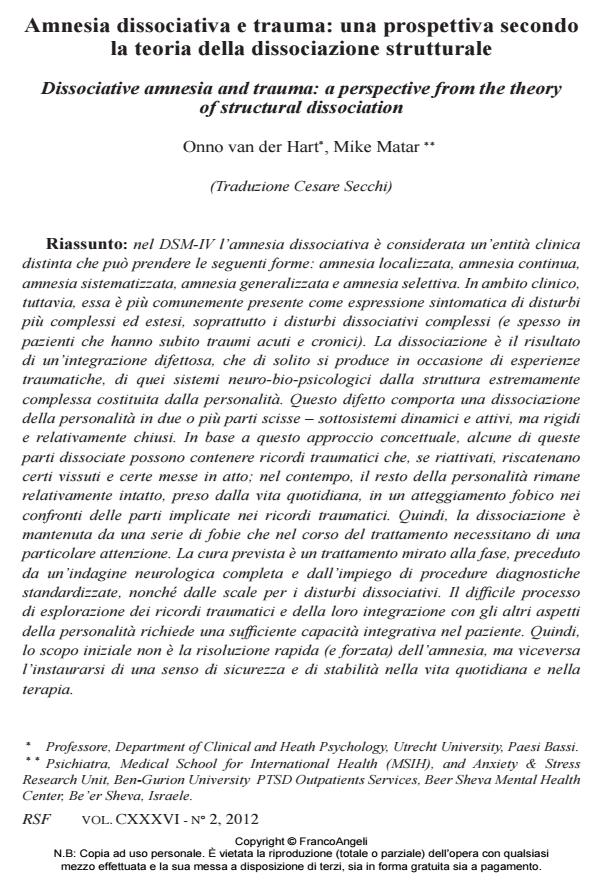Dissociative amnesia and trauma: a perspective from the theory of structural dissociation
Journal title RIVISTA SPERIMENTALE DI FRENIATRIA
Author/s Onno van der Hart
Publishing Year 2012 Issue 2012/2
Language Italian Pages 15 P. 121-135 File size 1743 KB
DOI 10.3280/RSF2012-002007
DOI is like a bar code for intellectual property: to have more infomation
click here
Below, you can see the article first page
If you want to buy this article in PDF format, you can do it, following the instructions to buy download credits

FrancoAngeli is member of Publishers International Linking Association, Inc (PILA), a not-for-profit association which run the CrossRef service enabling links to and from online scholarly content.
In DSM-IV dissociative amnesia is addressed as a discrete clinical entity, which may take the following forms: localized amnesia; continuous amnesia; systematized amnesia; generalized amnesia; and selective amnesia. In the clinical arena, however, it more commonly presents as one of the features of more complex and extensive disorders, primarily of complex dissociative disorders and frequently in acutely or chronically traumatized patients. Dissociation results from faulty integration of the complex and intricately coordinated neuro-bio-psychological systems which constitute the personality, usually developing when traumatizing events are experienced. This deficit entails a dissociation of the personality into two or more dissociative parts of the personality - dynamic and active, but rigid and relatively closed subsystems. Based on this conceptual approach, some of these dissociative parts may contain traumatic memories and, when reactivated, cause re-experiencing and re-enactments, whereas the rest remains relatively intact and is involved in daily living and is phobic of the parts involved in the traumatic memories. Thus, the dissociation is maintained by a series of phobias, that need careful attention in treatment. The standard of care is phase-oriented treatment, preceded by a thorough neurological investigation and the use of standardized diagnostic procedures and scales for dissociative disorders. The difficult challenge of exploring and integrating traumatic memories and further aspects of one’s personality requires that the individual’s integrative capacity be sufficient. Hence, the initial goal is not the rapid (and forceful) resolution of the amnesia, but rather establishing a sense of safety and stability in daily living and in therapy.
Keywords: Amnesia, dissociation, dissociative disorders, diagnosis, treatment.
Onno van der Hart, Amnesia dissociativa e trauma: una prospettiva secondo la teoria della dissociazione strutturale in "RIVISTA SPERIMENTALE DI FRENIATRIA" 2/2012, pp 121-135, DOI: 10.3280/RSF2012-002007